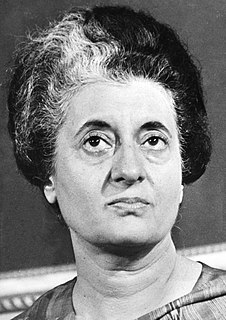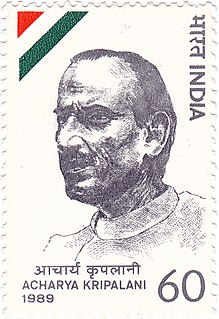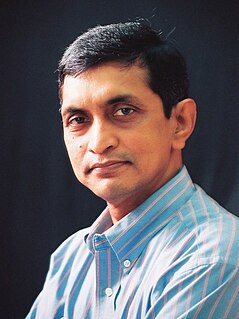Related Research Articles

Jayaprakash Narayan, popularly referred to as JP or Lok Nayak, was an Indian independence activist, theorist, socialist and political leader. He is also known as the "Hero of Quit India Movement" and he is remembered for leading the mid-1970s opposition against Prime Minister Indira Gandhi, for whose overthrow he had called for a "total revolution". His biography, Jayaprakash, was written by his nationalist friend and the writer of Hindi literature, Rambriksh Benipuri. In 1999, he was posthumously awarded the Bharat Ratna, India's highest civilian award, in recognition of his social work. Other awards include the Magsaysay award for Public Service in 1965.

The Janata Party was a political party that was founded as an amalgam of Indian political parties opposed to the Emergency that was imposed between 1975 and 1977 by Prime Minister Indira Gandhi of the Indian National Congress. In the 1977 general election, the party defeated the Congress and Janata leader Morarji Desai became the first non-Congress prime minister in independent modern India's history.
The National Advisory Council (NAC) of India was an body set up by the first United Progressive Alliance (UPA) government to advise the Prime Minister of India Manmohan singh. Sonia Gandhi served as its Chairperson for much of the tenure of the UPA.
This article gives an overview of liberalism in India.

The Swatantra Party was an Indian classical liberal political party, that existed from 1959 to 1974. It was founded by C. Rajagopalachari in reaction to what he felt was the Jawaharlal Nehru-dominated Indian National Congress's increasingly socialist and statist outlook.

The Congress Socialist Party (CSP) was a socialist caucus within the Indian National Congress. It was founded in 1934 by Congress members who rejected what they saw as the anti-rational mysticism of Gandhi as well as the sectarian attitude of the Communist Party of India towards the Congress. Influenced by Fabianism as well as Marxism-Leninism, the CSP included advocates of armed struggle or sabotage (such as Yusuf Meherally, Jai Prakash Narayan, and Basawon Singh as well as those who insisted upon Ahimsa or Nonviolent resistance. The CSP advocated decentralized socialism in which co-operatives, trade unions, independent farmers, and local authorities would hold a substantial share of the economic power.

In India, "The Emergency" refers to a 21-month period from 1975 to 1977 when Prime Minister Indira Gandhi had a state of emergency declared across the country. Officially issued by President Fakhruddin Ali Ahmed under Article 352 of the Constitution because of the prevailing "internal disturbance", the Emergency was in effect from 25 June 1975 until its withdrawal on 21 March 1977. The order bestowed upon the Prime Minister the authority to rule by decree, allowing elections to be canceled and civil liberties to be suspended. For much of the Emergency, most of Indira Gandhi's political opponents were imprisoned and the press was censored. Several other human rights violations were reported from the time, including a mass forced sterilization campaign spearheaded by Sanjay Gandhi, the Prime Minister's son. The Emergency is one of the most controversial periods of independent India's history.

Swarāj can mean generally self-governance or "self-rule", and was used synonymously with "home-rule" by Maharishi Dayanand Saraswati and later on by Mohandas Gandhi, but the word usually refers to Gandhi's concept for Indian independence from foreign domination. Swaraj lays stress on governance, not by a hierarchical government, but by self governance through individuals and community building. The focus is on political decentralisation. Since this is against the political and social systems followed by Britain, Gandhi's concept of Swaraj advocated India's discarding British political, economic, bureaucratic, legal, military, and educational institutions. S. Satyamurti, Chittaranjan Das and Motilal Nehru were among a contrasting group of Swarajists who laid the foundation for parliamentary democracy in India.

Jivatram Bhagwandas Kripalani, popularly known as Acharya Kripalani, was an Indian politician, noted particularly for holding the presidency of the Indian National Congress during the transfer of power in 1947 and the husband of Sucheta Kripalani. Kripalani was a Gandhian socialist, environmentalist, mystic and independence activist.

Bhagwant Singh Mann is an Indian politician. Since May 2014, he is the Member of Parliament, Lok Sabha for Sangrur constituency, Punjab. He has also been a professional comedian who performs skits in the Punjabi language.

Arvind Kejriwal is an Indian politician and a former bureaucrat who is the current and 7th Chief Minister of Delhi since February 2015. He was also the Chief Minister of Delhi from December 2013 to February 2014, stepping down after 49 days of assuming power. Currently, he is the national convener of the Aam Aadmi Party, which won the 2015 Delhi Assembly elections with a historic majority, obtaining 67 out of 70 assembly seats. In 2006, Kejriwal was awarded the Ramon Magsaysay Award for Emergent Leadership in recognition of his involvement in the grassroots level movement Parivartan using right to information legislation in a campaign against government corruption. The same year, after resigning from Government service, he donated his Magsaysay award money as a corpus fund to found the Public Cause Research Foundation, a non-governmental organisation (NGO).
The Bihar Movement was a political movement initiated by students in the Indian state of Bihar in 1974 and led by the veteran Gandhian socialist Jayaprakash Narayan, popularly known as JP, against misrule and corruption in the state government. It later turned against Prime Minister Indira Gandhi's government in the central government. It was also called Sampoorna Kranti and JP Movement.
Satyendra Narayan Sinha was an Indian politician and statesman, participant in the Indian independence movement, a leading light of Jaya Prakash Narayan's ‘complete revolution’ movement during the Emergency and a former Chief Minister of Bihar. Affectionately called Chhote Saheb, he was also a seven-time Member of Parliament from the Aurangabad constituency, a three-term Member of the Bihar Legislative Assembly, and a Member of the Bihar Legislative Council once. Regarded to be one of India's most influential regional people of the time, his reputation was synonymous with being a strict disciplinarian and tough taskmaster.

Lok Satta is a classical liberal political party in India, founded by Nagabhairava Jaya Prakash Narayana, a former I.A.S. officer and renowned activist from Andhra Pradesh. Since 1996, the Lok Satta Movement functioned as a non-governmental organisation, but on 2 October 2006, the movement was reorganised into a formal political party. The party intends to further the causes of the Lok Satta Movement, including a reduction in the size of the cabinet, promotion of the Right to Information Act, and disclosure of criminal records and assets by political candidates. Beginning with the 2009 elections the party has adopted a whistle as their official symbol. On 23 March 2016, the party founder president, Jayaprakash Narayan said that they will not take part in electoral politics for sometime.

Jaya Prakash Narayana, is an Indian liberal politician and activist. He is the founder and president of Lok Satta Party. He served as a Member of the Legislative Assembly from Kukatpally constituency of Andhra Pradesh in India. In May 2014, he contested from Malkajgiri as a Member of Parliament and lost.

Lok Satta is a non-partisan movement for democratic reforms in the country of India, led by Dr. Jayaprakash Narayan, a former I. A. S. officer and renowned activist from Andhra Pradesh, India. The movement was started in 1996 with the founding of Lok Satta, a non-governmental organization. In 2006, the movement transformed into Lok Satta Party.

Aam Aadmi Party is a political party in India, whose central policies include free electricity, water, healthcare and public transport. It styles itself as an alternative to the mainstream Bharatiya Janata Party and Indian National Congress. It currently runs the state government in Delhi, having held a supermajority in the Delhi Legislative Assembly since the 2015 election, limiting BJP to a few seats and pushing Congress out entirely. It retained its supermajority in the 2020 elections.

The next Indian general election is scheduled to be held in or before May 2024 to elect the members of 18th Lok Sabha.
The Youth Parliament or Youth Parliament Program (YPP), an integral part of the Swatantrata Center, is a liberal public policy think-tank based in India which focuses on ideas and policies that cause human flourishment and India's Future Foundation, Foundation for Democratic Reforms under the leadership of Raghavendar Askani and Dr. Jayaprakash Narayan for the youth, to speak up and make an impact on the change agenda for the country.

Venkatesh Geriti is an Indian classical liberal, anti-corruption activist, and social entrepreneur. He is the founder of Swatantrata Center and India's Future Foundation, an educational organization in Hyderabad, and a scholar at Atlas Summit. Venkatesh received the Karmaveer Chakra Award and Global Fellowship Award in 2019 from ICONGO in Partnership with United Nations. He is a member of the Centre for Civil Society and an alumnus of Foundation for Economic Education.
References
- ↑ "Latest Foundation For Democratic Reforms News". Lokmat English. Retrieved 17 September 2020.
- ↑ "Why Andhra's Jaya Prakash Narayana Failed Where Delhi's Arvind Kejriwal Succeeded". The Wire. Retrieved 17 September 2020.
- ↑ Foundation for Democratic Reforms
- ↑ "J P Narayan". Centre For Civil Society. 9 November 2015. Retrieved 19 July 2020.
- ↑ "Will Jayaprakash Narayan's Lok Satta Party be another nail in the coffin of old political parties?". The Economic Times. Retrieved 17 September 2020.
- ↑ Haseeb, Ahssanuddin. "Why IAS Officer-Turned-Politician Jaya Prakash Narayan Failed To Capture Power In AP Where Arvind Kejriwal Succeeded In Delhi?". #KhabarLive Hyderabad. Retrieved 17 September 2020.
- ↑ "About us • Youth Parliament Program". Youth Parliament Program. Retrieved 19 July 2020.
- ↑ "Surajya Movement | Foundation for Democratic Reforms" . Retrieved 19 July 2020.
- ↑ "Vice President calls for effective laws against huge election expenditure by parties and populist spending by governments". pib.gov.in. Retrieved 19 July 2020.
- ↑ "Conference on 'Money Power in Politics' on January 9". thehansindia.com. 3 January 2020. Retrieved 19 July 2020.
- ↑ "Naidu advocates evolving laws to control 'Money Power in Politics'". magzter.com. Retrieved 19 July 2020.